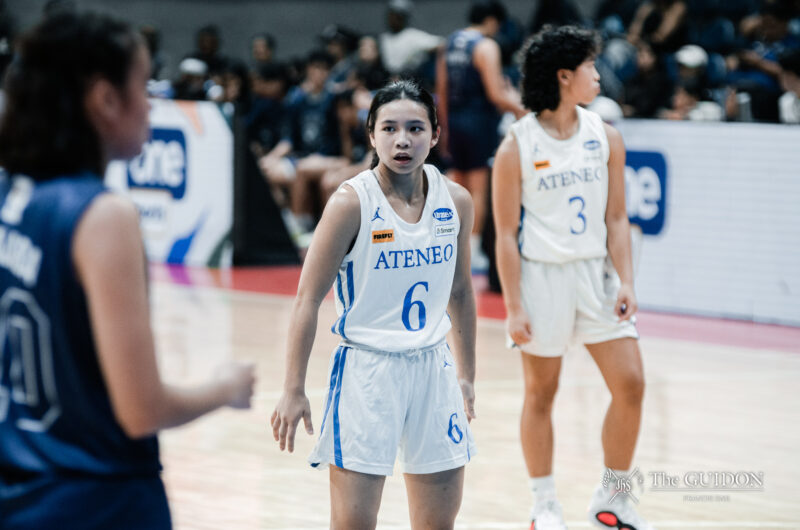The new school year marks the beginning of many things. For college freshmen, it is the beginning of their year in a new school, of wandering half-lost in it. For upperclassmen, it is the beginning of another year where they could do better than before in their academics. For their professors, it is to prepare for another year of rigorous academics.
For some students, however, it will be their first college year outside the Loyola Schools. At the end of his freshmen year, Shawn* had to leave the Loyola Schools because of his poor grades. “The Big Wait,” as he refers to it, was the time he spent constantly checking his AISIS account. It concluded on April 5, when grades were finally released. “I faced three F’s and my pathetic excuse of a QPI,” he says.
Getting kicked out of the Loyola Schools for academic reasons is more common an occurrence than most people think.
Unfair expectations?
In a school considered to be one of the best in the country, the grunt of academic rigors takes its toll on students. According to two surveys conducted by the Psychology Department on the Loyola Schools population over the past eight years, students consistently ranked academics as their top source of stress.
Academic stress not only affects those in danger of getting low grades, as academic achievers are not exempted. Ma. Emma Concepcion Liwag, Ph.D., associate professor of the Psychology Department, explains that academic stress can be interpreted in many ways by different students. For some, the difficult nature of a subject may be the cause of this, as well as the intense work load their teachers may impose. Poor academic performance could also be a factor.
It also has a lot to do with a student’s expectations. “Maybe you can have a student who gets B pluses, but if he expects to get an A, he’s still stressed.”
Others, however, find difficulty not only in taking their subjects, but in adjusting to the entire college experience as well. For Samantha*, a lot of factors came into play, which is why she was put under probation last year. Having come from the province, living alone for the first time in her life was stressful enough. Adding the collegiate academic load only worsened her situation.
Not studying well and doing tasks at the last minute proved to be disastrous for her. “Good study habits go a long way in Ateneo,” she says. She admits that, in her case, study habits were nonexistent during high school.
Loyola Schools Guidance Office (LSGO) Counselor Albert Go says that students are especially vulnerable during their freshman year because of the adjustments they have to make. To monitor the freshmen, the LSGO requires them to schedule a routine Guidance interview once a year, as is also required for upperclassmen. Also, the office of the Associate Dean for Academic Affairs (ADAA) releases the advisory marks of the freshmen in the middle of each semester.
Academic stress can go both ways, says Liwag. When a person feels that he is capable of handling stress, it can actually be motivating. It is when a person finds himself overwhelmed by stress that trouble comes in.
Although the academically stressed student’s body can break down physically, it is more common for him to experience psychological and emotional consequences. Manifestations include depression, aggression, anxiety, and helplessness. Shawn admits to feeling depressed and regretful after first finding out his freshman year QPI.
Decision makers
The office of the Associate Dean for Academic Affairs (ADAA) decides who are forced to withdraw or stay in probation. Working with the ADAA is the Standards Committee, which helps influence the decisions regarding the probationary status of the students. This committee is composed of an official chair, a student representative, faculty, and a graduate student representative.
According to the 2006 edition of the Loyola Schools undergraduate student handbook, “The promotion, graduation, or separation of a student from the Loyola Schools is determined by the Quality Point Index (QPI) of the student.” For freshmen, the minimum QPI is 1.8 at the end of the school year. Sophomore students, on the other hand, need to attain at least 1.9 while the juniors and seniors need to have a minimum grade of 2.0 to stay in the Ateneo.
In 2004, the school required the students to reach the minimum QPI after every semester, but because of the difficulty in finding new schools in the middle of school year, the standards committee decided to make the probation a yearly decision.
To apply for probation, the student must first accomplish the standards committee form. He must also state his reasons for getting a low QPI, which might include medical or family problems. The student then can refer at least two teachers who would be willing to speak on his behalf – an optional but highly recommended step.
Factors for probation
According to Interdisciplinary Studies Department Chair and former ADAA Concepcion Rosales, the standards committee looks at different factors when deciding who will be forced to withdraw or stay on probationary status.
Aside from the QPI, the committee also looks at the student’s character based on the faculty’s recommendation letters. Students who have a QPI of 1.50 or below are usually the target of character evaluation.
Aside from looking at the student’s character, the committee will also search into the disciplinary cases handled by the Associate Dean for Student Affairs. Rosales explains that, if a particular student were involved in a case such as plagiarism, the committee might not consider granting him probation.
If that student were granted probationary status, then he must attain the QPI required of him in the next semester. Students who are not granted probation, however, might have to transfer to other schools where they may stay for a year and try to appeal for another chance in the Ateneo. To be re-accepted, he must get an average higher than or equal to 87, which is equivalent to B+ by Loyola Schools’ standards.
Help from Ateneo
For probationary students, LSGO has a program called “Probation Follow-up Program.” The program helps the students to identify problems which cripple their academic performance. As stated in the student handbook, the program also “helps them [the students] develop attitudes and necessary skills to be able to cope with their academic load.”
In the end, however, it is ultimately up to the students to ask for help. “We can’t really monitor them unless they come here,” says Go. He cites current ADAA Eduardo Calasanz, Ph.D. as one who personally makes sure that students with poor academic performance due to emotional problems are brought into the LSGO.
A just QPI?
According to Rosales, a QPI of 1.8 gives a student flexibility on academic performance as it allows for two Ds. Cultivating the concept of magis, which means “more” in Latin, the school opted for a 1.8 minimum QPI instead of 1.0. This is to urge students to generate academic excellence.
Rosales further explains that withdrawal from the Ateneo doesn’t mean the end of things. She remembers an Ateneo student who was asked to leave the school, but was later found to have a profitable business in New York City, USA.
Finding an identity
Failure to hit the yearly QPI requirement can also be a result of having other interests in mind. Students who get into the Ateneo are assumed to have an interest in academics and in ultimately learning a college degree. But according to Liwag, some students might not feel the same.
She hypothesizes that there are segments in the Ateneo community who don’t feel the need to achieve academically, most likely because they are raised in a pampered environment. Also, some students may see college as an opportunity to explore other aspects of themselves. For students who are mostly still in the adolescent phase, exploring their identity is an integral part of this stage.
Being a student is an identity in itself. “Not everyone perhaps has already brought into that identity [of being a student],” Liwag says. These people, however, are usually aware of their responsibilities but are far too interested in other things. For some, this could simply be a passage in life and eventually put themselves together in the end.
When Go faces students with this mindset, he often tells them to try to revisit their goals. According to him, most students nowadays tend to “live by the moment”. By being reminded of their goals, it is hoped that student regain the focus they had lost.
Farewell to the Blue and White
“I wasn’t expecting to pass,” Shawn says. Although he did feel the initial wave of depression and regret, it didn’t last too long as he already saw it coming. He thought he stood a chance at passing Fil11 and NatSci2, but apparently, he did not.
According to Liwag, who was also part of the Standards Committee, it’s never easy deciding on who stays and who doesn’t. People generally see the situation as adverse, that there is no hope. Based on her experience, it is not easy persuading students that there is always a bright side to the situation especially when they are still overwhelmed by emotions.
There then lies the spirit of the Standards Committee, where collective decision making is based on what is best for the student. When a student is granted probationary status, the committee also ensures his welfare.
“How can we ensure that this doesn’t happen again? How can we help the student help himself?” are questions the committee always seeks to answer.
Even when letting a student go, the committee takes note of what can be done to help the student. Ultimately, it may be a case of simply being in the wrong school. “Sometimes we tell them that maybe Ateneo is not for you… Ateneo is not the perfect school for everyone,” says Liwag.
Shawn admits that Ateneo’s standards are higher than other schools, but sees this as a good thing. “I guess it’s what makes us Atenean,” he says.
Samantha agrees, saying that Ateneo’s standards fit the school well, as failing to uphold them would mean diminishing the Ateneo name and the prestige that comes along with it. She is quick to add, however, that her frame of mind did not help in her ordeal.
She initially felt helpless, enough to consider quitting and applying for other schools instead. But she eventually used her probationary status to motivate herself. A few weeks ago, she received a letter from the ADAA stating that she was released from probationary status. “I’m going to tack this [letter] in my room,” she beams.
Meanwhile, Shawn will be transferring to a different school this coming June but says that people shouldn’t count him out, as he will try his best to get back into the Ateneo.
Go says that one of the most important things in counseling the students is reminding them that there’s always hope. He adds that counselors should give a sense of hope but not false hope. “You make them hope for the best but expect the worst,” he says. That way, students are given options on what to do. It may involve having to shift to another course, or, sometimes, moving to a different school. Go points out, however, that the important change is what occurs in a student—how he is able to handle the situation.
“It’s not about the schools,” Go says. “It’s about you.”
*Names have been changed to protect the individuals.
Don’t be a statistic
Two college professors and a guidance counselor offer tips on how not to be one of the probationary or kicked-out students:
1. Know yourself.
Liwag says that if you really know yourself you will find yourself in a course which you will really thrive in. If students can exercise that degree of self-knowledge as well as enough assertiveness and autonomy to say, “This is what I want to do.”
2. Have the right attitude.
The LSGO and other institutions can only do so much, Go says. In the end, it’s the student’s prerogative to ask for the help he needs.
3. Be a responsible student.
According to Rosales, read the syllabus and find out what requirements will be expected of you and attend classes. Make the library your second home and curtail your student organizations in your freshman year.
4. Remember that college takes discipline.
You have to learn to balance your life. “It’s not alright to be too absorbed with your books. At the same time, it’s not alright not to open your books at all,” Liwag says in a mix of Filipino and English.
5. Make sure you’re doing what you should do.
Students enjoy more when they know they’ve finished their academic responsibilities. Go says that students must prioritize what they think should be prioritized.
6. Maintain a good study habit.
According to Rosales, one hour of lecture is equal to two hours of study. “That’s the Galdon rule,” she says. “For every hour you spend in the classroom, you spend two hours outside.”
7. Revisit your goals.
Why are you here in Ateneo? Why did you choose your course? According to Go, students nowadays are “living in the moment” too much that they cease to see long-term goals.







rubbish..elitist
I need some help po, I’ve been in the same situation and same school. I really want someone to talk and share my feelings. Please help.